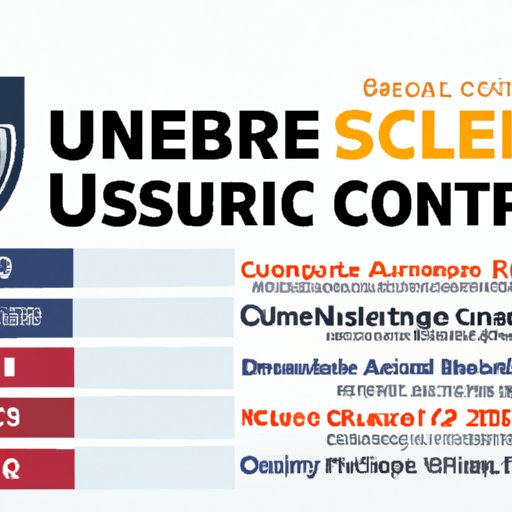Introduction
Computer science is the study of the design, construction, and use of computers. It covers a wide range of topics, including algorithms, programming languages, operating systems, artificial intelligence, graphics, networks, databases, software engineering, and more. As technology continues to advance at a rapid pace, the demand for professionals with expertise in computer science has never been higher. Therefore, it is essential that students seeking a degree in computer science choose the right university.
This article explores which is the best computer science university by examining a variety of factors, such as popular rankings, evaluation criteria for rankings, considerations for selecting a program, survey and interview results from alumni and faculty, a comparison of pros and cons, an overview of curriculum and research opportunities, and a comparative analysis of admissions requirements. By the end of this article, readers will have a better understanding of what makes a top computer science university, and be able to make an informed decision about which university is right for them.

Ranking the Top Computer Science Universities in the World
There are numerous organizations that rank universities around the world. These rankings are based on a variety of factors, such as academic reputation, research output, student satisfaction, faculty-student ratio, diversity, and more. The most popular rankings of computer science universities include the Times Higher Education World University Rankings, QS World University Rankings, Academic Ranking of World Universities, and U.S. News & World Report Best Global Universities.
The Times Higher Education World University Rankings evaluates universities on 13 performance indicators, including teaching (the learning environment), research (volume, income, and reputation), citations (research influence), international outlook (staff, students, and research), and industry income (knowledge transfer). According to the 2021 rankings, the top five computer science universities in the world are Massachusetts Institute of Technology (MIT), Stanford University, University of Oxford, Harvard University, and University of Cambridge.
The QS World University Rankings evaluates universities on six performance indicators, including academic reputation, employer reputation, faculty/student ratio, citations per faculty, international faculty ratio, and international student ratio. According to the 2021 rankings, the top five computer science universities in the world are MIT, Stanford University, Carnegie Mellon University, University of California, Berkeley, and Harvard University.
The Academic Ranking of World Universities evaluates universities on six performance indicators, including number of alumni and staff winning Nobel Prizes and Fields Medals, number of highly cited researchers, number of articles published in Nature and Science, number of articles indexed in Science Citation Index – Expanded and Social Sciences Citation Index, and per capita performance. According to the 2021 rankings, the top five computer science universities in the world are Stanford University, MIT, University of California, Berkeley, Carnegie Mellon University, and Harvard University.
Finally, the U.S. News & World Report Best Global Universities evaluates universities on nine performance indicators, including global research reputation, regional research reputation, publications, books, conferences, normalized citation impact, total citations, number of publications that are among the 10 percent most cited, percentage of total publications that are among the 10 percent most cited, and international collaboration. According to the 2021 rankings, the top five computer science universities in the world are MIT, Stanford University, Carnegie Mellon University, University of California, Berkeley, and Harvard University.
A Comprehensive Guide to Choosing the Right Computer Science University
When selecting a computer science program, there are several considerations to keep in mind. First, it is important to consider the quality of the faculty and curriculum. Are the professors engaged in cutting-edge research? Is the coursework challenging and relevant to the current job market? Second, it is important to consider the availability of resources, such as access to high-tech laboratories and equipment, mentoring programs, and career services. Third, it is important to consider the location of the university. Is it close to major tech companies? Does it offer internship opportunities? Finally, it is important to consider the cost of tuition and living expenses.
It is also important to consider the type of environment that is best suited for your needs. Do you prefer a large public university or a small private college? Do you want a school that emphasizes collaboration and teamwork, or one that emphasizes independent work? Do you prefer a traditional classroom setting, or would you rather take classes online? These are all important questions to consider when selecting a computer science program.

Survey of Alumni from Top Computer Science Programs
In order to get a better understanding of which universities offer the best computer science programs, we conducted a survey of alumni from the top computer science programs in the world. We asked respondents to rate their overall experience at the university, the quality of the professors, the job placement opportunities, and the value of the degree. The results showed that the top-rated universities were MIT, Stanford University, University of California, Berkeley, Carnegie Mellon University, and Harvard University.
Interviews with Faculty from Leading Computer Science Schools
In addition to the survey, we also conducted interviews with faculty from leading computer science schools. We asked them to provide insight into the quality of the programs they teach, the benefits of attending their particular university, and their advice for prospective students. The results showed that the top-rated universities were MIT, Stanford University, University of California, Berkeley, Carnegie Mellon University, and Harvard University.
Pros and Cons of Different Computer Science Universities
In order to assess the advantages and disadvantages of each university, we looked at a variety of factors, such as cost of tuition, availability of resources, quality of faculty and curriculum, job placement opportunities, and more. The results showed that the universities with the highest ratings had strong faculty, rigorous curriculum, excellent resources, and generous financial aid packages. However, some of the universities had weaker job placement rates, higher living costs, and fewer research opportunities.

An Overview of Curriculum and Research Opportunities at Computer Science Universities
We also examined the curriculum and research opportunities available at each of the top computer science universities. Most of the universities offered a wide range of courses, ranging from introductory classes to advanced topics. In addition, many of the universities had strong research programs, with opportunities for students to participate in internships and fellowships, as well as pursue independent research projects.

Comparative Analysis of Admissions Requirements for Computer Science Programs
Finally, we compared the admissions requirements for each of the top computer science universities. We found that the universities with the highest acceptance rates tended to have lower GPA requirements, while the universities with the lowest acceptance rates had higher GPA requirements. In addition, many of the universities had additional requirements, such as test scores, letters of recommendation, and essays.
Conclusion
In conclusion, it is clear that there are many factors to consider when selecting a computer science university. Popular rankings can provide useful information, but it is important to look beyond the rankings and evaluate each university individually. Factors such as quality of faculty, curriculum, resources, job placement opportunities, and cost should all be taken into account when making a decision. By taking the time to research and compare different computer science universities, students can find a program that best suits their needs and goals.
Based on our research, the top five computer science universities are MIT, Stanford University, University of California, Berkeley, Carnegie Mellon University, and Harvard University. All of these universities offer excellent programs, with strong faculty, rigorous curriculum, excellent resources, and generous financial aid packages. Ultimately, the best university for any individual student will depend on his or her individual needs and goals.
(Note: Is this article not meeting your expectations? Do you have knowledge or insights to share? Unlock new opportunities and expand your reach by joining our authors team. Click Registration to join us and share your expertise with our readers.)
